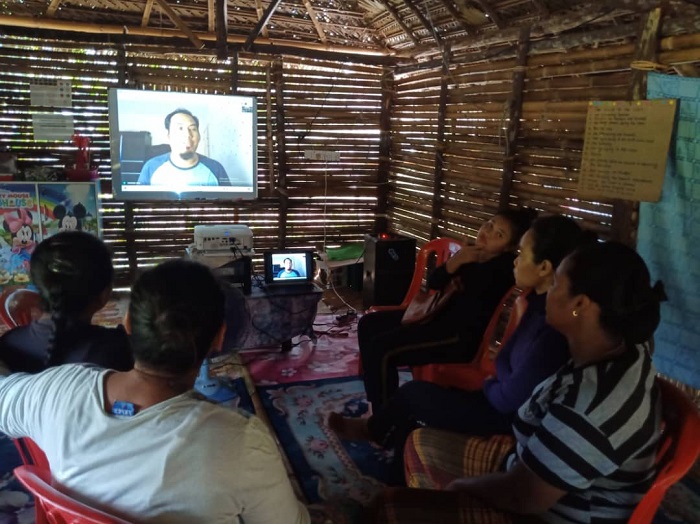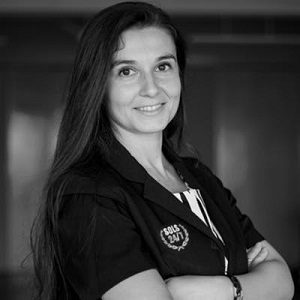- US$100k for scaling Skills Hub platform, US$100k worth of devices from HP
- Run workshops in 12 Orang Asli villages, touch 10k graduates for Skills Hub

 [Ed: Headline corrected. An earlier version gave the wrong name for the foundation.]
[Ed: Headline corrected. An earlier version gave the wrong name for the foundation.]
“I would consider Orang Asli to sometimes even be B20 because there’s more of a digital divide for them to cross, while the B40 are in urban areas that have better accessibility to internet,” said Danutcha Catriona Singh (pic, left), Managing Director of Science of Life Studies (SOLS) Foundation.
Established in 2000, it is a non-profit education provider seeking to help, educate and empower marginalized communities across Malaysia, especially the B40 and Orang Asli with free education, employment support, professional and personal development. Like most organisations engaged in education and development, it transitioned online during the pandemic and now offers its services through a hybrid model.
The foundation’s work received a huge boost last month when it became one of three Malaysian organizations selected into the California based Aspen Institute’s Digital Equity Accelerator run with HP Inc. This is an initiative created in 2022 that works to advance social and economic equality by investing in non-profit organizations that are accelerating digital inclusion.
The National Cancer Society of Malaysia and Dignity For Children Foundation are the other two Malaysian organizations, along with seven others from Mexico and South Africa.
“We are honored and excited to be selected for 2023. What we’re equally excited about is that not only will this initiative enable us to scale our impact and reach even more individuals in need through our Skills Hub platform, but we are also being given the opportunity to learn directly from mentors and trainers throughout this process,” Danutcha said.
Skills Hub teaches hard and life skills such as English, digital skills (3D printing), practical skills (wiring, woodworking), and professional and personal development. It was developed when the pandemic struck, stopping all physical classes and operations.
“We had to send all our students back and close all our centers. We didn’t know what to do with the teachers because they couldn’t teach, so within the span of around two months we set up the online Skills Hub platform,” Danutcha recounted.
“Aspen Digital and HP have shown commitment not only to provide access to cash grants, technology and hardware, but are actually investing in our people, who are our most precious resource and instrumental in helping us achieve our mission,” Danutcha adds.
As part of the Aspen cohort, SOLS will receive learning, mentorship, and capacity-building support with the modules around learning focused on, Operations (technical development & organizational management); Leadership; Branding and Marketing; and Impact and Evaluation.
For mentorship, they will receive technical expert consultations while for capacity building, they will receive an unrestricted grant of US$100,000 (RM455,000) for scaling up Skills Hub. Danutcha plans to do this in two ways – to create a repository of recorded content for students whenever they want, and, to support different programs like workshops.
Additionally, SOLS Foundation wants to set up mobile teaching units under Skills Hub, utilizing the US$100,000 (RM455,000) worth of devices from HP. These units will be brought into Orang Asli communities that often don’t have these items. This hands-on approach is critical as some Orang Asli communities live off-grid.
Another pain point the mobile units solve for the B40 is to give them more access to devices. While smartphone prices have come down significantly, Danutcha notes that it is not unusual for devices to be shared by family members. “They may only receive the device when someone comes home or when there are no live classes at the time.”
Digital literacy a foundation skill into online world
“We have to be there in person and reach out,” says Daniela Strîmbei (pic), executive director of SOLS. “Realistically, until we meet and sit down with each community, we don’t fully understand their needs,” Daniela says. This interaction helps the mobile teaching unit programs to be tailored to individual needs, community by community.
Teaching the Orang Asli digital literacy is seen by SOLS Foundation as a foundational skill to the online world. “Then we teach them how to access education and training online, not just from us, but also from other sources,” she says. Beyond educational needs, training also opens up the world of government services, banking, business and health support.
Besides Orang Asli and urban poor, TVET (Technical and vocational education and training) students, who are predominantly B40 are also a main focus group. SOLS Foundation has found that having skills in a vocational subject doesn’t translate to the students getting jobs that they trained for, let alone enjoy career progress. “Therefore, Skill Hub has a variety of modules which helps them for job readiness, use the skills that they have learned, maintain their job employability and progression,” Danutcha said.
According to Daniela, the impact of their work is measured by a Sustained Impact approach that measures employment, businesses launched and the number of students who go on for further education.
“We do ‘pre’ and ‘post’ comparisons, checking on the awareness and skills before, and with an assessment at the end,” she explains.
Furthermore, six months after training, there is another check to gauge whether students have improved their lives with the knowledge and tools gained.
On the plans moving forward, Daniela says, “With Orang Asli, the focus is very much on digital literacy. For working adults or young people, the focus is on personal and professional development skills with modules such as job readiness, small financial literacy skills, etc; while for TVET students it will be around digital upskilling.”
Boosted with the Aspen accelerator and grant money, Daniela hopes that by the middle of 2024, “we want to run workshops and follow-ups in at least 12 different Orang Asli villages, and touch 10,000 graduates for Skills Up.”



.JPG)